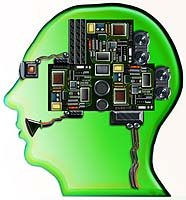| Magazine Home I Links I Contact Us |
|
Home |
Memory and Learning Disabilities
A variety of memory problems are evidenced in the learning disabled. Some major categories of memory functions wherein these problems lie are: Receptive memory: This refers to the ability to note the physical features of a given stimulus to be able to recognize it at a later time. The child who has receptive processing difficulties invariably fails to recognize visual or auditory stimuli such as the shapes or sounds associated with the letters of the alphabet, the number system, etc. Sequential memory: This refers to the ability to recall stimuli in their order of observation or presentation. Many dyslexics have poor visual sequential memory. Naturally this will affect their ability to read and spell correctly. After all, every word consists of letters in a specific sequence. In order to read one has to perceive the letters in sequence, and also remember what word is represented by that sequence of letters. By simply changing the sequence of the letters in name, it can become mean or amen. Some also have poor auditory sequential memory, and therefore may be unable to repeat longer words orally without getting the syllables in the wrong order, for example words like preliminary and statistical. Rote memory: This refers to the ability to learn certain information as a habit pattern. The child who has problems in this area is unable to recall with ease those responses which should have been automatic, such as the alphabet, the number system, multiplication tables, spelling rules, grammatical rules, etc. Working memory or short-term memory: Working memory or short-term memory lasts from a few seconds to a minute; the exact amount of time may vary somewhat. When you are trying to recall a telephone number that was heard a few seconds earlier, the name of a person who has just been introduced, or the substance of the remarks just made by a teacher in class, you are calling on short-term memory, or working memory. You need this kind of memory to retain ideas and thoughts when writing a letter, since you must be able to keep the last sentence in mind as you compose the next. You also need this kind of memory when you work on problems. Suppose a problem required that we first add two numbers together (step 1: add 15 + 27) and next divide the sum (step 2: divide sum by 2). If we did this problem in our heads, we would need to retain the result of step 1 (42) momentarily, while we apply the next step (divide by 2). Some space in our working memory is necessary to retain the results of step 1. Long-term memory: This refers to the ability to retrieve information of things learned in the past. Until the learning disabled develop adequate skills in recalling information, they will continue to face each learning situation as though it is a new one. No real progress can be attained by either the child or the teacher when the same ground has to be covered over and over because the child has forgotten. It would appear that the most critical need that the learning disabled have is to be helped to develop an effective processing system for remembering, because without it their performance will always remain at a level much below what their capabilities indicate. Strangely, though, while memory is universally considered a prerequisite skill to successful learning, attempts to delineate its process in the learning disabled are few, and fewer still are methods to systematically improve it.
|
| Home A B C D E F G H I J K L M N O P Q R S T U V W X Y Z |